Majority of Americans Oppose Ground Troops In Syria And Iraq
In the wake of President Obama's to send Special Forces to Syria, a new poll finds the public doesn't like the idea very much.
A new Gallup poll finds that a majority of Americans oppose sending American ground troops to fight ISIS in Iraq and Syria:
WASHINGTON, D.C. — As the U.S. intensifies its airstrikes against Islamic State militants in Syria and Iraq, Americans are more likely to oppose (53%) than support (43%) sending U.S. ground troops to these countries to help groups there fight the militants. These figures haven’t changed significantly since September 2014 after President Barack Obama launched airstrikes against the Islamic State group and other militant groups.
The latest data are from a Nov. 4-8 Gallup poll, as airstrikes have intensified in Syria after a lull late last month. The Obama administration announced in October that it would deploy 50 special operations troops on the ground in Syria, after Obama said two years ago that he would “not put American boots on the ground” there.
Last year, Gallup found that Americans were more inclined to support the broad concept of U.S. “military action” in Iraq and Syria, with 60% approving. But there was far less support when Americans were asked specifically about sending ground troops, with 40% in favor at that time.
Support for sending ground troops continues to differ by political party and ideology. The issue has been politicized at home, including by Republicans during the presidential debate this week. While several of the candidates — including Florida Sen. Marco Rubio and former Florida Gov. Jeb Bush — have spoken in favor of sending troops, they have questioned the president’s strategy, with some candidates suggesting the deployment was late or did not use enough troops to accomplish the task.
A majority of both Republicans (56%) and conservatives (54%) support sending ground troops to Iraq and Syria to combat Islamic State militants.
Meanwhile, less than half of moderates (41%) and political independents (39%) favor the deployment of ground troops. Liberals (31%) and Democrats (37%) are equally or less likely to support that action.
(emphasis added)
This poll comes in the wake of the President’s announcement late last month that the United States would be sending a small contingent of special forces operators into Syria to more directly train so-called “moderate” rebels. As I noted at the time, however, it seems exceedingly clear that, based on the history of escalation, usually after failure of previous policy alternatives, that has exemplified the President’s policies in this area for the past year or more, this is only the beginning of American involvement on the ground in Syria and Iraq. It’s true that we are unlikely to see large American armies heading into Iraq again, or into Syria, but the possibility of increased involvement on the ground is something that cannot be ruled out given the direction that Obama’s policies have been moving since the summer of 2014, and the comments being made on the campaign trail by the candidates seeking to succeed him. Lindsey Graham, for example, has called for as many as 20,000 American troops on the ground and most recently suggested an American ground force as part of a broader coalition that includes Turkey and Arab nations opposed to ISIS. Graham’s position is one that many other Republicans are likely to adopt as some point as they try to out-hawk each other. Additionally, Hillary Clinton who was speaking against the idea of ground troops in Syria in the past, is now making statements supportive of the President’s decision to send in special forces. No doubt, Clinton’s position on this issue would evolve further as necessary, and her overall hawkish foreign policy suggests it is likely to evolve in favor of further intervention.
What this poll shows, of course, is that the American people tend to be wiser than their leaders when it comes to these matters. To no small degree, it’s probable that this attitude is due at least in part to the lessons learned in the wake of the Iraq War and a the long conflict in Afghanistan which, while it started out as a justifiable response to the September 11th attacks, has evolved into something that is seemingly never ended. While it is true that the President and his advisers should not necessarily be guided solely by public opinion, there are situations where it should be considered and this is one of them. As I’ve said before, there is no coherence to American policy in Syria right now except for a cycle of escalation that makes no sense whatsoever. The American people obviously see this, and their leaders ought to be listening.
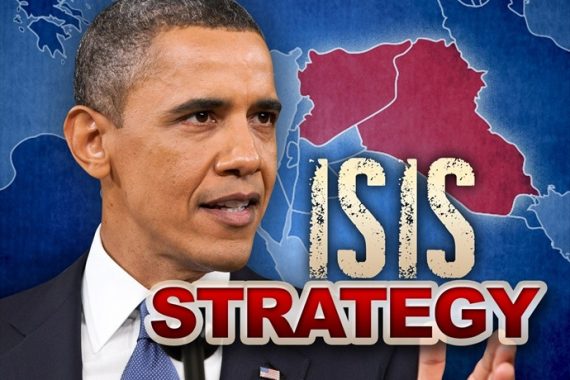

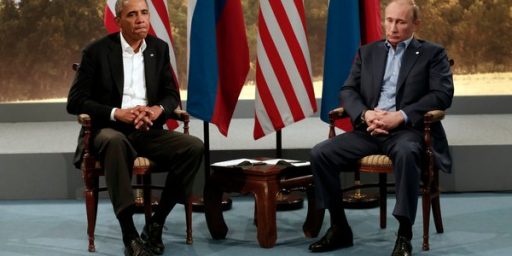
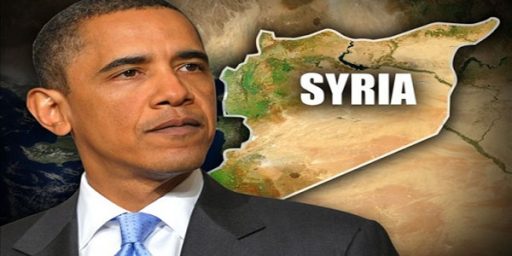
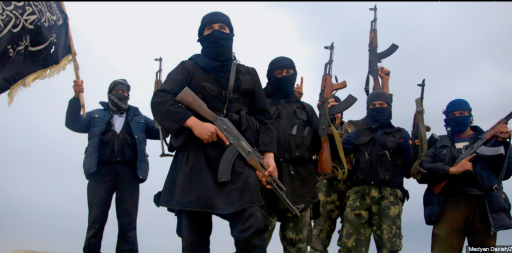
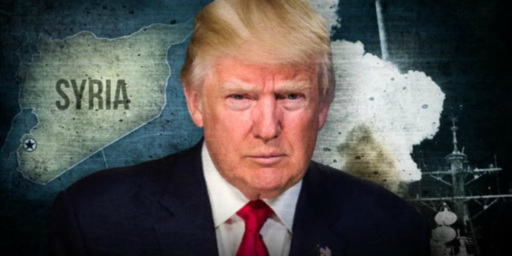
Did they survey for imposing a no fly zone (as nearly all of the candidates want)? That strikes me as an even worse idea, as it would quickly bring us into conflict with Russia.
@Moosebreath:
Haven’t you heard? It’s the Chinese you need to be worrying about! They’re everywhere!
Yes, and the Mataconis “coherent” policy is. . .?
Meanwhile, back in the real world, Kurdish forces, with US air support , retake Sinjar from ISIS and a US drone strike kills ISIS leader Jihadi John. But go on trolling with your ” incoherent strategy” meme, Doug, while POTUS continues to win.